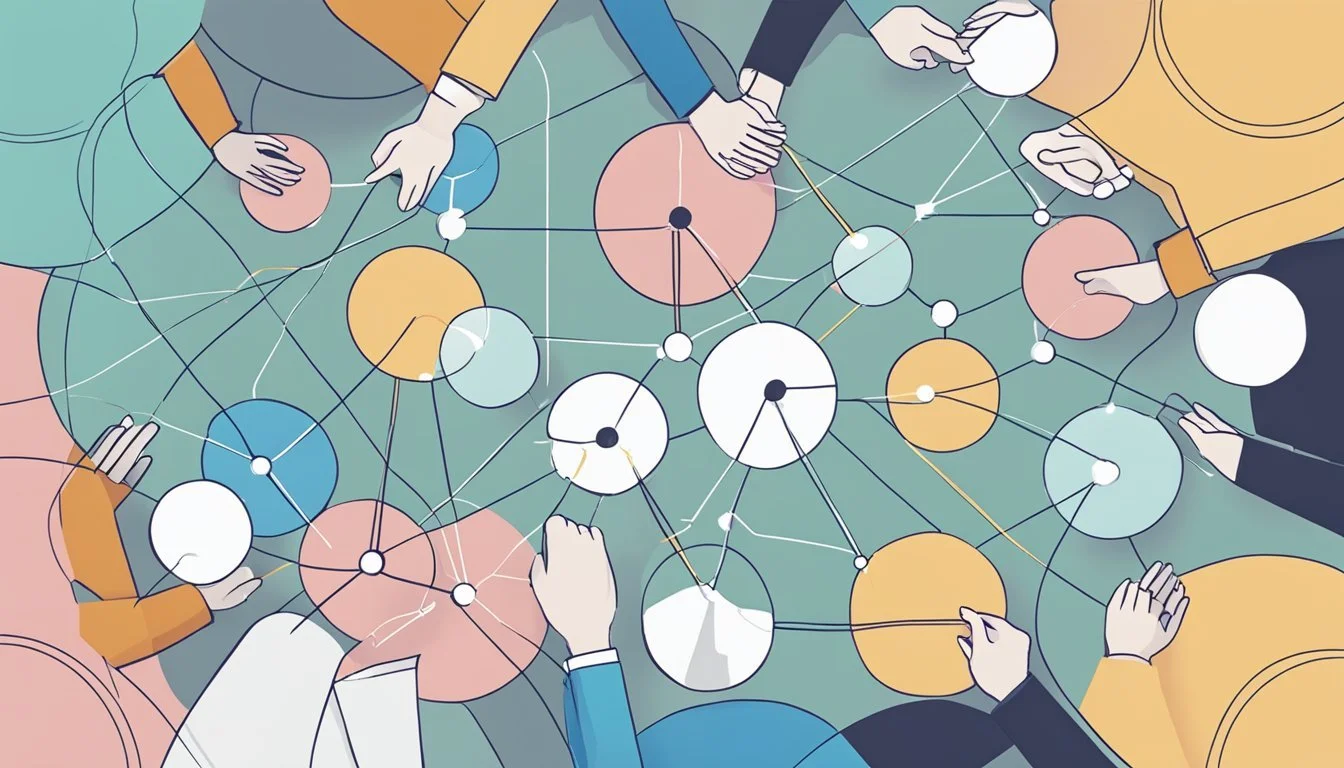7 Ways Trauma Can Impact Your Friendships
Understanding the Effects and How to Cope
Trauma can profoundly affect various aspects of a person's life, including their friendships. Relationships built on trust and mutual support can become strained as individuals grapple with the lingering effects of traumatic experiences.
Understanding how trauma impacts friendships can be key to recognizing and addressing issues that arise from these complex emotions. By exploring the various ways trauma influences social bonds, readers can better navigate the challenges and foster healthier, more resilient connections.
1) Emotional Distance
Trauma can often lead to significant emotional distance in friendships. Individuals who experience trauma may struggle with trust and find it challenging to open up to others. This defensive mechanism is their way of protecting themselves from potential pain.
Emotional distance can make it difficult for friends to offer support. The individual might not communicate their needs or feelings, leading to misunderstandings. Over time, this lack of communication can erode the closeness of the friendship.
Sometimes, this distance is linked to avoidant attachment styles developed in childhood. People with avoidant attachment may push others away to avoid emotional vulnerability. This behavior can be confusing and hurtful for friends who do not understand the underlying trauma.
Emotional distance can manifest in various ways. It might include avoiding deep conversations, withdrawing from social activities, or appearing indifferent. While these actions might be a coping mechanism for the traumatized individual, they often strain the friendship.
Addressing emotional distance involves building a safe environment where the traumatized individual feels comfortable expressing themselves. Friends can help by being patient, listening actively, and encouraging open dialogue. Understanding the causes of emotional distance is the first step toward maintaining strong, supportive friendships.
2) Difficulty Trusting Others
Trauma can significantly impede an individual's ability to trust others. Those who have experienced trauma may find it hard to feel safe or secure in their relationships. The emotional wounds left by past events often breed mistrust.
People who suffer from trauma might develop hyper-vigilance. They are constantly on the lookout for potential threats or signs of deception. This heightened alertness can strain friendships.
Communication challenges are commonplace. Trauma survivors often struggle to express their emotions clearly, which can create misunderstandings and barriers with friends. They may hesitate to share their feelings, fearing judgment or rejection.
Trust issues can lead to isolative behaviors. Individuals may prefer solitude over risking potential hurt, making it challenging to form deep, meaningful connections. This self-protection mechanism, while understandable, can hinder the development of healthy friendships.
Trauma may also heighten sensitivity to perceived slights or betrayals. Friends might unintentionally trigger these sensitivities, leading to conflicts or withdrawal. Understanding and addressing these patterns is crucial.
The mistrust is often rooted deeply, developing early in life and persisting into adulthood. Overcoming these trust issues typically requires patience, understanding, and sometimes professional help.
Being aware of these trust-related challenges is a step toward healing. Friends of trauma survivors should strive to build a supportive and non-judgmental environment. This can slowly help in rebuilding the lost trust and fostering stronger, healthier friendships. For more insights on this topic, refer to this article on unresolved relational trauma.
3) Increased Sensitivity
Individuals who have experienced trauma may exhibit heightened emotional sensitivity. This can occur because their nervous system remains in a state of hyper-awareness, leading to intense reactions to seemingly minor triggers.
Small actions or words from friends might be perceived as threats or criticisms. This heightened sensitivity can create misunderstandings and conflicts in friendships.
Trust issues often accompany increased sensitivity. Trauma survivors may find it difficult to trust others fully, causing them to read too much into their friends' behavior.
Over time, this can lead to a cycle of withdrawal and isolation. Friends might feel they need to walk on eggshells around them, which can strain the relationship.
In extreme cases, trauma can cause people to avoid forming close relationships altogether. They fear the possibility of being hurt again and thus keep their distance. This avoidance can significantly impact the quality and depth of their friendships.
4) Fear of Rejection
Trauma can often instill a deep-seated fear of rejection in individuals, impacting their ability to form and maintain friendships. People with rejection sensitivity may exhibit self-protective behaviors, such as avoiding emotional intimacy or preemptively ending relationships to shield themselves from potential hurt.
The brain plays a key role in this fear. The amygdala stores memories of rejection, giving these experiences significant emotional weight. This can make any hint of rejection feel immensely painful and overwhelming.
Rejection-sensitive individuals may overreact to perceived slights or isolate themselves to avoid the risk of being hurt. This behavior can strain friendships, making lasting connections difficult to achieve. Taking steps to address these fears is crucial for building stronger relationships.
Strategies for overcoming the fear of rejection include nurturing self-confidence, fostering a strong social support system, and taking proactive steps to build resilience. These methods can help individuals believe in their ability to bounce back, making them more open to forming genuine connections.
Reducing the risk of rejection also requires daring to trust in oneself and others. By stepping over fears and doubts, one can gradually learn to appreciate themselves and trust that others will do the same. This journey, though challenging, is essential for healthier, more fulfilling friendships.
5) Avoiding Intimacy
Trauma can lead individuals to avoid intimacy in their friendships. This avoidance often stems from a fear of vulnerability and emotional pain. They might guard themselves, keeping friends at a distance.
Intimacy avoidance can result in surface-level interactions. Deep, meaningful connections may feel threatening. Such individuals tend to shy away from sharing personal details and emotions.
People who avoid intimacy may also exhibit controlling behaviors. They prefer to control the environment and the dynamics of the relationship to avoid potential hurt.
Feeling engulfed or overwhelmed by emotional closeness is common for those with trauma. This can lead to withdrawing from friends or not fully engaging in the relationship.
This behavior can be seen in relationships affected by PTSD. Individuals with PTSD might struggle with connecting deeply due to past experiences.
6) Overreacting to Conflict
Individuals with past trauma may experience heightened sensitivity to conflict in friendships. This heightened state can trigger exaggerated emotional reactions, which are disproportionate to the situation at hand.
Such overreactions can stem from unresolved feelings of fear or insecurity. Trauma often leaves individuals with a fragile sense of safety and trust, making any disagreement feel threatening.
In many cases, even a minor conflict might trigger responses rooted in past traumatic experiences. These responses can include intense anger, anxiety, or withdrawal as they attempt to protect themselves emotionally.
Consequently, conflict resolution becomes more challenging. The individual may struggle to remain calm and rational, complicating efforts to address and resolve disputes.
Overreacting to conflict can also strain the friendship. Friends may feel confused or overwhelmed by the disproportionate reactions, leading to feelings of distance or frustration.
This pattern can create a cycle where the individual anticipates and fears conflict, leading to further overreactions. This reinforces their initial fears, perpetuating the cycle.
Understanding the impact of trauma can help friends be more patient and supportive. Offering a safe space for open communication is essential to breaking this cycle and fostering healthier interactions.
More information about trauma and its effects on behavior can be found here.
7) Inconsistent Communication
Trauma can lead to inconsistent communication within friendships. Individuals may struggle with anxiety or depression, causing them to withdraw intermittently. They might not respond to messages or calls promptly, leading to misunderstandings.
This inconsistent behavior can stem from their need to protect themselves emotionally. They may fear vulnerability or rejection, causing them to put up walls and disappear suddenly from social interactions.
Friends might find it challenging to rely on someone whose communication is unpredictable. This unpredictability can create frustration and confusion, impacting the trust and stability within the friendship. Trauma may cause individuals to oscillate between being overly communicative and completely silent, depending on their emotional state at the time.
Inconsistent communication can erode the foundation of a friendship. Friends may feel neglected or unimportant, leading to strained relationships. Understanding the impact of trauma on communication patterns can help in managing expectations and maintaining healthier connections.
Addressing these issues directly with compassion can help. Encouraging open dialogue, setting boundaries, and seeking professional help are some strategies to cope with inconsistent communication patterns, promoting a more stable and supportive friendship environment.
Understanding Trauma
Trauma can have far-reaching effects on mental health and personal relationships. It is essential to comprehend different types of trauma and their psychological impacts.
Definition And Types Of Trauma
Trauma refers to the emotional response to a distressing event, often leaving enduring psychological effects. There are several types of trauma: acute, chronic, and complex.
Acute trauma results from a single overwhelming event, such as an accident or natural disaster.
Chronic trauma stems from prolonged exposure to distressing situations, like ongoing abuse.
Complex trauma involves exposure to varied and multiple traumatic events, often within interpersonal relationships.
Recognizing the type of trauma is essential for addressing its impacts and exploring appropriate therapeutic methods.
Psychological Effects Of Trauma
Trauma profoundly affects mental health, influencing behavior and emotional stability. People may experience anxiety, depression, and post-traumatic stress disorder (PTSD).
It can alter brain function, affecting areas like the limbic system, responsible for emotion and memory. Specifically, untreated trauma might impact the autonomic, endocrine, and central nervous systems, causing structural changes.
Survivors often face communication challenges and trust issues, which can strain friendships and social interactions. Recognizing these effects is crucial for seeking effective treatments and building supportive environments.
Emotional Impact On Friendships
Trauma can deeply affect emotional interactions within friendships. Two significant impacts include increased anxiety and withdrawal, and heightened sensitivity and reactivity.
Increased Anxiety And Withdrawal
An individual who has experienced trauma may exhibit increased anxiety within friendships. This anxiety often manifests as fear of judgment or abandonment.
Such fears can lead to withdrawal from social interactions. The person might avoid gatherings or decline invitations, fearing that their trauma will become a topic of discussion or that they will be unable to handle social situations.
This behavior can create distance in friendships, making it difficult to maintain close bonds. The lack of communication and engagement might be perceived as a lack of interest or commitment from the affected person’s friends, exacerbating the emotional divide.
Heightened Sensitivity And Reactivity
Trauma can heighten sensitivity to perceived slights or negative reactions. The individual might overreact to minor issues, interpreting them as significant betrayals or threats.
This heightened reactivity can create tension in friendships, as friends might feel they are walking on eggshells to avoid triggering the trauma survivor. The survivor’s increased vigilance can cause misinterpretations of intentions, leading to unnecessary conflict.
Friends might struggle to understand the root of these increased emotional responses. It is crucial for those affected to communicate their needs clearly and for friends to show empathy and patience. This understanding can help navigate these challenging emotional landscapes.
Building Healthy Relationships Post-Trauma
Creating healthy relationships after experiencing trauma involves establishing clear boundaries and implementing effective communication strategies. These practices are vital in fostering trust and ensuring emotional safety for everyone involved.
Establishing Boundaries
Boundaries act as guidelines for acceptable behaviors within relationships. They are crucial in maintaining mental and emotional well-being for trauma survivors. Setting boundaries helps individuals distinguish their own needs from others, reducing the risk of further emotional distress.
To set boundaries, one should first identify personal limits and comfort zones. This can be achieved through self-reflection and understanding personal triggers. It's important to communicate these boundaries clearly to friends, ensuring there is mutual understanding and respect.
Enforcing boundaries is equally important. If a boundary is crossed, addressing the issue promptly, with calm assertiveness, reinforces its importance. Adjustments may be necessary over time as comfort levels and personal growth evolve.
Effective Communication Strategies
Clear and empathetic communication is the bedrock of healthy relationships post-trauma. Trauma can impair a person's ability to express thoughts and feelings, making effective communication essential for rebuilding trust and intimacy.
Using "I" statements instead of "You" statements helps convey feelings without sounding accusatory. For example, saying "I feel anxious when plans change suddenly" is more constructive than "You always change plans."
Practicing active listening, where individuals genuinely pay attention and respond thoughtfully, encourages openness. Reflecting back what has been said shows understanding and validation, which is essential for a trauma survivor's sense of security.
Non-verbal cues, such as maintaining eye contact and nodding, can also enhance communication. These signals show attentiveness and support, making the conversational environment safe and receptive.
Support Systems And Resources
Building strong support systems and accessing available resources can significantly aid in navigating the aftermath of trauma in friendships. Here are some effective ways to find support and guidance.
Seeking Professional Help
Engaging with a licensed therapist or counselor can provide crucial support. Therapists are trained to help individuals understand and process trauma, which can improve relationships. Cognitive-behavioral therapy (CBT) and Eye Movement Desensitization and Reprocessing (EMDR) are two commonly recommended approaches.
Another valuable resource is community mental health centers, which often offer sliding scale payment options. These centers provide access to professional help even for those with limited financial means. Online therapy platforms are also an option, offering flexibility and privacy for those who prefer virtual sessions.
Community And Support Groups
Joining community groups can offer a sense of belonging and shared understanding. Local support groups, such as those found through hospitals or community centers, provide a space for people to share experiences and coping strategies.
Organizations like Mind also offer valuable resources and forums. Additionally, online communities can connect individuals with similar experiences, offering support and advice from a broader network. These groups can be particularly helpful in fostering a supportive environment and reducing feelings of isolation.







